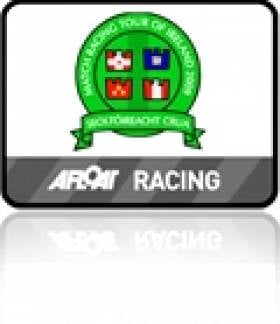Displaying items by tag: nations
Eight Teams Advance to Nations Cup Semifinals
Friday's conditions—a light southeasterly breeze that forced race officials to delay the first start until about 1 p.m.—were a marked change from the previous two days of racing that featured moderate to heavy winds and choppy seas.
In the open division, the semifinal berth came down to the wire in a race between Haddad (crew Mario Trindade, Victor Demaison) and Shawn Bennett (USA) who went into the final match tied with two wins each. Przemek Tarnacki (POL) finished with one win and Peter Wickwire (CAN) was winless in the round.
Goncalves (crew Mariana Lobato, Diane Neves) went 3-0 in the women's division repechage round robin. Genny Tulloch (USA) won two races, Juliana Senfft (BRA) won one race and Ru Wang (CHN) was winless in the round.
Following the repechage, sail-offs to determine placing from fifth down were held, and the most exciting race of the day was held during this round when Bennett and Tarnacki battled it out. Bennett drew a foul in the prestart and managed to pass Tarnacki going upwind. At the top mark, the teams went into a dial-up that carried them well past the mark. Bennett was able to break free and lead for the rest of the race, but still had to complete his penalty turn. His team was managed to get the turn in right at the line and cross just feet in front of Tarnacki for the win.
Jason Bemis, President of Sail Sheboygan, which is hosting the event at its facility optimized for match racing, said the competition has been even better than anticipated.
"We've had spectacular weather all week that has made for some great competition," Bemis said. "Today we had a little bit of a slow start but the breeze finally switched to the southeast and built for some great afternoon racing. Tomorrow's forecast looks good and we expect a large spectator fleet to be on hand for some fierce competition in the semifinals and finals."
Placements for those not moving onto the semifinals are:
Open Division (sailed in Sonars):
5th Shawn Bennett (USA, crew Dave Perry, Craig Healey)
6th Przemek Tarnacki (POL, crew Lukasz Wosinski, Maciej Zieminski)
7th Stratis Andreadis (GRE, crew Stelios Sotiriou, Theodoros Polychrondis
8th Peter Wickwire (CAN, crew Tim Bishop, Matt Christie)
9th Yasar Celal Tumse (TUR, crew Canberk Karahan, Berk Can Biren)
Women's Division (sailed in Elliott 6m's):
5th Genny Tulloch (USA, crew Alice Manard, Jenn Chamberlin)
6th Juliana Senftt (BRA, crew Gabriela Sa, Luciana Kopschitz)
7th Ru Wang (CHN, crew Pan Ting Ting, Li Xiao Ni)
8th Sharon Ferris-Choat (CAN crew Caroline Kaars Sijpesteijn, Joanne Prokop)
9th Katarzyna Pic (POL Antonina Zoltowska, Monika Kordek)
10th Dominique Provoyeur (RSA Penny Alison, Caitlin Moore)
Racing continues Saturday with the start of the semifinal round.






























































